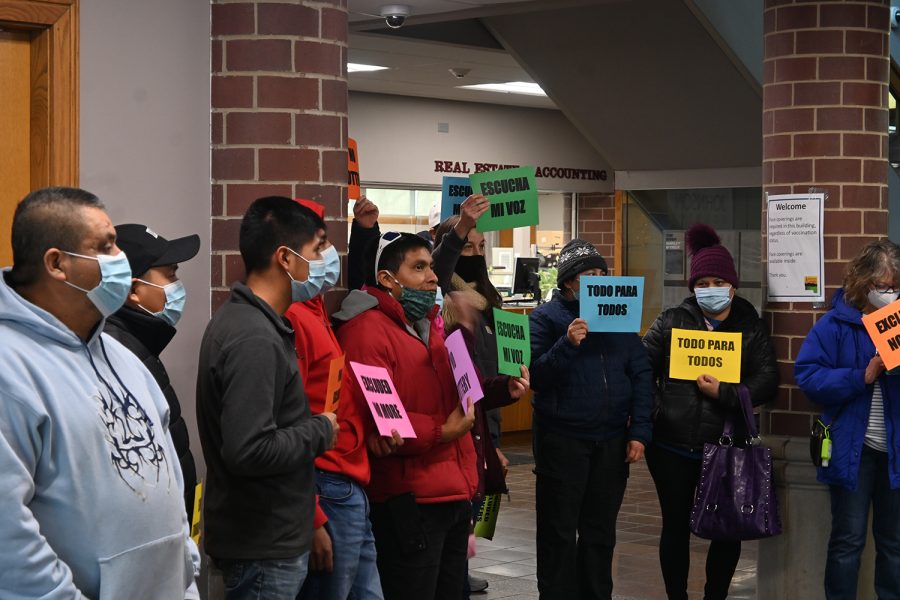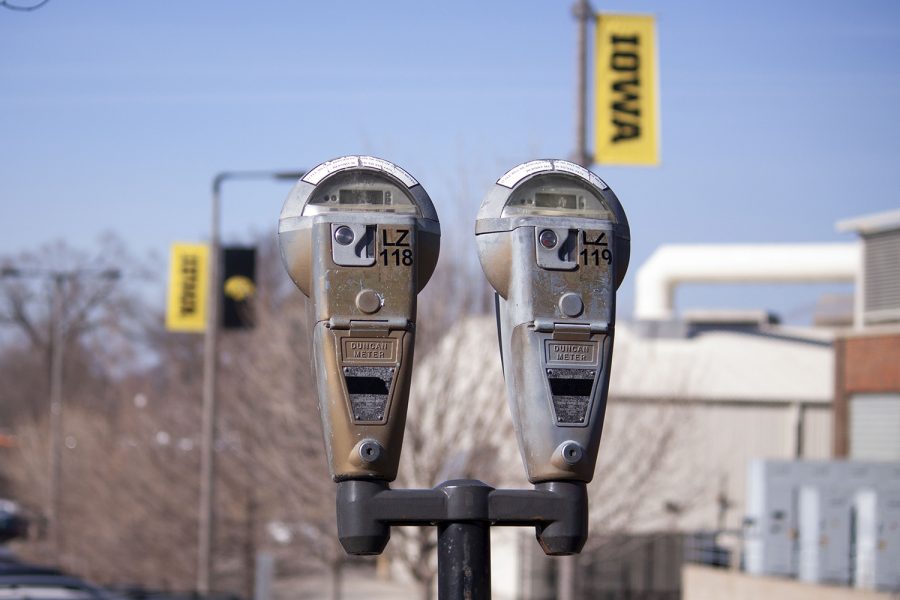Conversations to hike minimum wage from state and federal levels have raged on even before the effort was shoved to the front burner by one Iowa senator last year.
The issue has evolved into a hot-button topic of discussions made at the 2014 Iowa GOP and Democratic Party state conventions during the past two weeks, and supporters have made it the face of so-called economic-recovery efforts after the 2008 financial meltdown.
In their push against income inequality, the Obama administration has spoken forcefully about raising the minimum wage, placing it front and center in its recent endeavors.

In a Monday addresses at the White House Summit on Working Families, Obama called for raising the federal minimum wage to $10.10 per hour over the course of the next three years. Nearly 28 million Americans would benefit if that increase were to be implemented, he contended.
Over the past decades, the federal minimum wage has risen; in 1978, the minimum wage stood at $2.65. However, that is worth $9.67 in 2013 dollars, according to the Congressional Research Service.
Obama also announced plans to individually increase the minimum wage for federal contractors.
“Since I asked Congress to raise the minimum wage last year, they’ve been a little slow, shockingly, but 13 states have taken steps to raise it on their own,” Obama said. “In my State of the Union Address this year, I asked mayors and governors and CEOs — do what you can to raise your workers’ wages, and a lot of them are. A lot of them are doing it.”

But even before Obama’s announcement, a handful of states, from Maryland and Massachusetts to cities such as Seattle, have taken a liking to elevating their wage floors.
“Despite the growth in the U.S. economy and those at the very top doing quite well, the average income hasn’t gone up in 15 years in any meaningful way. And that means that relative to 15 years ago, a lot of families aren’t that much better off. And the sacrifices they make for their families go beyond just missing family dinner,” Obama said.
According to a June report published by the National Conference of State Legislatures, 38 states considered minimum-wage bills during the 2014 session.
Massachusetts is poised to set its new minimum wage standard at $11 an hour — nearly 50 percent higher than the federal rate — to place it as the fifth state this year to set the nation’s highest minimum wage.
With a signature from that state’s Democratic Gov. Deval Patrick, expected early next week, minimum wage would increase by $1 each year until 2017.
Five-term Sen. Tom Harkin, D-Iowa, has been one of the nation’s most vocal advocates for minimum wage increases during his tenure on Capitol Hill.
The Fair Minimum Wage Act of 2013, put forth by Harkin and Rep. George Miller, D-Calif., would gradually raise the federal minimum wage from $7.25 to $10.10 by 2016, while increasing the amount that “tipped workers” such as servers are compensated.
During an address in front of more than 500 at the Iowa Democratic Party’s Hall of Fame dinner, where he was inducted on June 20, Harkin said he intends to ensure the bill is passed before his upcoming retirement at the end of his term.
The minimum wage in Iowa is set at $7.25, which mirrors a federal minimum wage that has not changed since 2009. As of 2012, roughly 46,000 Iowans worked for the minimum wage.
Still, several state and national experts say a federal minimum-wage increase appears unlikely in 2014, even while more states seek to move on more wage legislation.
Eight states and D.C. enacted increases during the 2014 legislative sessions.
Chris Larimer, an associate professor of political science at the University of Northern Iowa, co-wrote “The Determinants of Policy Introduction and Bill Adoption: Examining Minimum Wage Increases in the American States 1997-2006,” which was published last year in the Policy Studies Journal.
Larimer said that while political differences play a role in whether a national minimum wage bill is adopted, they tell just part of the whole story.
“Politics does matter, but it matters in a sense that if you have a Democratic legislature, you’re more likely to see a minimum-wage bill increased across all states,” Larimer said. “But it has no effect on whether or not the bill is actually adopted.
“As long as Republicans control one chamber, I don’t think we’ll see a minimum-wage bill pass.”
But at least one state economist says that discussing the minimum wage goes beyond the party platforms, and it should be abolished altogether.
University of Iowa economics adjunct lecturer Patrick Barron maintained that there are few professional economists who argue in favor of minimum-wage hikes because of the profound results that accompany that.
Barron said two prominent issues arise in the United States because a minimum wage exists: unemployment and a vast variety of social consequences, from large swaths of unemployable populations to increased crime and welfare.
Most of the individuals who continue to argue for new wage standards across the nation are simply activists, not real certified economists, he said.
“It’s one of the more breathtakingly stupid and blind things that people will recommend and governments will do,” Barron said. “If there were no minimum wage, people would hire you for whatever you’re worth.”
The national minimum wage has increased 11 times since 1978.
Heather Gibney, a research associate at the Iowa Public Policy Project in Iowa City, said after analyzing studies over the past 10 years, her office has concluded that an increased minimum wage would have a minimal impact on the net employment across the United States.
The center’s analyzations of the studies did not consider the proposed $10.10 per hour wage, Gibney said. However, if the newly discussed hourly earnings were to be implemented, she said the aforementioned minimal impact would still ring true
Reductions in employer health-insurance offerings, smaller pension contributions, and increased worker training initiatives could grow out of the heftier wage levels, Gibney said.
“One of the things that opponents consistently go to is [that] teenagers won’t be able to get a job,” she said. “Why are we worrying about 16-year-olds getting jobs? It’s just kind of a silly argument.”
When employers pay higher wages, Gibney said, employee job turnover decreases, which leads to fewer costs associated with job-training programs.
This particular issue of economics has been a highlight on a number of political fronts.
For example, states that have gubernatorial and U.S. Senate races, such as Iowa, are being closely watched, in part because of their divisive attitude on raising the wage floor, said Timothy Hagle, a UI associate professor of political science.
Still, one UI professor maintained that both Republicans and Democrats are right to a certain extent in their arguments regarding the wage floor.
John Solow, a UI professor of economics, noted that with increases in state and federal minimum wages, some low-labor, low-skill workers will see layoffs, while others may climb the income ladder.
“It’s crazy to think there would be no effect on unemployment,” Solow said. “Republicans say its a job killer because it increases unemployment and jobs are cut. They’re right to that, but the question is how much."
Among the most vulnerable industries for unemployment and who may be hurt the most by minimum-wage increases are the massive U.S. fast-food industry and big-box retailers, such as Walmart, who pay minimum wage for the majority of their workforce, he said.
The least affected, he said, include research and technology firms, including Apple, General Motors, and aeronautics giant Boeing.
Gretchen Hamel, a campaign spokeswoman for Republican Senate candidate Joni Ernst, said Ernst has had and continues to have the same position on minimum-wage guidelines, despite numerous attacks ads that say otherwise from the Bruce Braley Democratic campaign.
“She believes that the federal minimum wage is a good safety net,” Hamel said. “It should be a state conversation.”
In a 90-minute debate on Des Moines prime-time television in May, Ernst suggested that the federal government should not set a minimum wage.
Sam Lau, the press secretary for the Senate campaign of Rep. Bruce Braley, D-Iowa, said Braley will continue to advance the prominent issue that is supported broadly by both Iowans and the country as a whole.
“If you work hard in a full-time job, you should be able to support your family. That’s why, along with Sen. Tom Harkin, I am fighting to increase the minimum wage to $10.10 and give 300,000 Iowans a pay raise, and I would continue this fight in the U.S. Senate,” Braley said in a statement.
David Young, the Republican candidate for Iowa’s 3rd Congressional District, and his staff had not returned calls or email requests from the DI as of Tuesday evening.
Ben Miller, the communications director for Staci Appel, who is running as Young’s Democratic opponent, said the former state senator will make the issue of raising the wage floor a priority. Her first bill in the Iowa Senate proposed raising the minimum wage.
“Staci does support increasing the minimum wage, beginning with her time in the Iowa Senate, where one of the first votes she cast was increasing it to $7.25 an hour and again during this campaign when she talks about her support for Sen. Harkin’s bill to raise the minimum wage to $10.10 an hour.”






